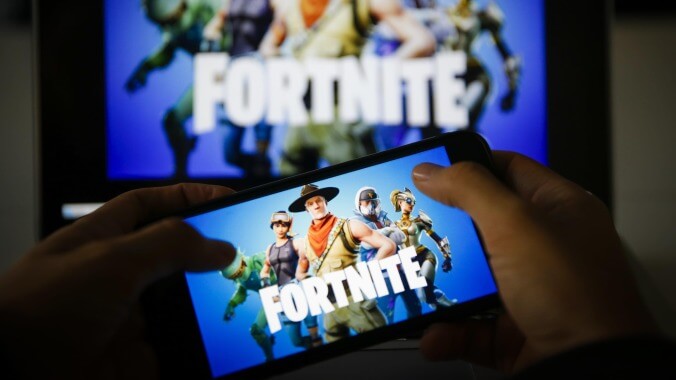Load up the Battle Bus and pick where you’re dropping, because it looks like it’s time for a fight: Over the course of just a few hours, a feud between Apple and Fortnite maker Epic Games has escalated to the point where Epic has actually filed a lawsuit against the tech company over allegations of “anti-competitive restraints and monopolistic practices” on its App Store. That’s where we’re at now, but let’s back up and see how we got here.
Apple and Google get a 30 percent cut of all money that goes through their platforms, so by instituting this new payment system, Epic could having to pay these fees and pass the savings onto the consumer by lowering the price—effectively establishing Apple and Google as “the bad guys.” It was very clever, and it unsurprisingly pissed off Apple. Pretty much immediately, the tech company pulled Fortnite from the app store, explaining in a statement to The Verge that the game had violated App Store guidelines by launching a new feature that had not been approved ahead of time. Apple explained that Epic has benefited from being on the App Store in the past due to the “tools, testing, and distribution” that Apple provides, and going behind Apple’s back is a threat to the secure ecosystem that it has cultivated. Pretty standard responses all around.
But Epic didn’t show up for a standard corporate disagreement, it showed up for a damn battle royale. As it turns out, Apple pulling Fortnite was all part of Epic’s master plan: This afternoon, Epic filed the aforementioned lawsuit, noting (among other things) that you can buy stuff on a Mac desktop without having to go through Apple’s store, but by limiting the options available to a user on iPhone, it has created “a total monopoly in the iOS App Distribution Market.” In other words, this is not about Fortnite V-Bucks, it’s about Apple having absolute control over what happens on iPhones.
In the lawsuit, Epic mentions Apple’s iconic 1984-themed commercial that established it as the cool computer company that was going to dismantle the technological oppression of IBM, arguing that Apple itself has now become the Big Brother figure. Then, just in case it wasn’t clear that Epic had been planning this entire thing, it released a new animated short online and in Fortnite that featured one of the game’s characters destroying a big screen with a corporate apple man—an obvious and consciously heavy-handed parody of the Apple ad. It even ends with “#FreeFortnite” and an extremely self-important call for fans to help “stop 2020 from becoming 1984.” It is, to put it mildly, a lot.
Epic has posted a “#FreeFortnite” FAQ page on its website that explains what’s going on from its perspective (it uses the phrase “Apple blockade” and offers advice on how to get a refund from the App Store, even though all of your Fortnite purchases can be used across every platform), the most notable of which being that future Fortnite updates won’t be coming to the iOS version until Apple backs down. So far, Apple hasn’t released a buzzy hashtag of its own, but it probably has to carefully plan its next move in case Epic has another cartoon in the chamber that positions this as a war over basic human rights.

 Keep scrolling for more great stories.
Keep scrolling for more great stories.
